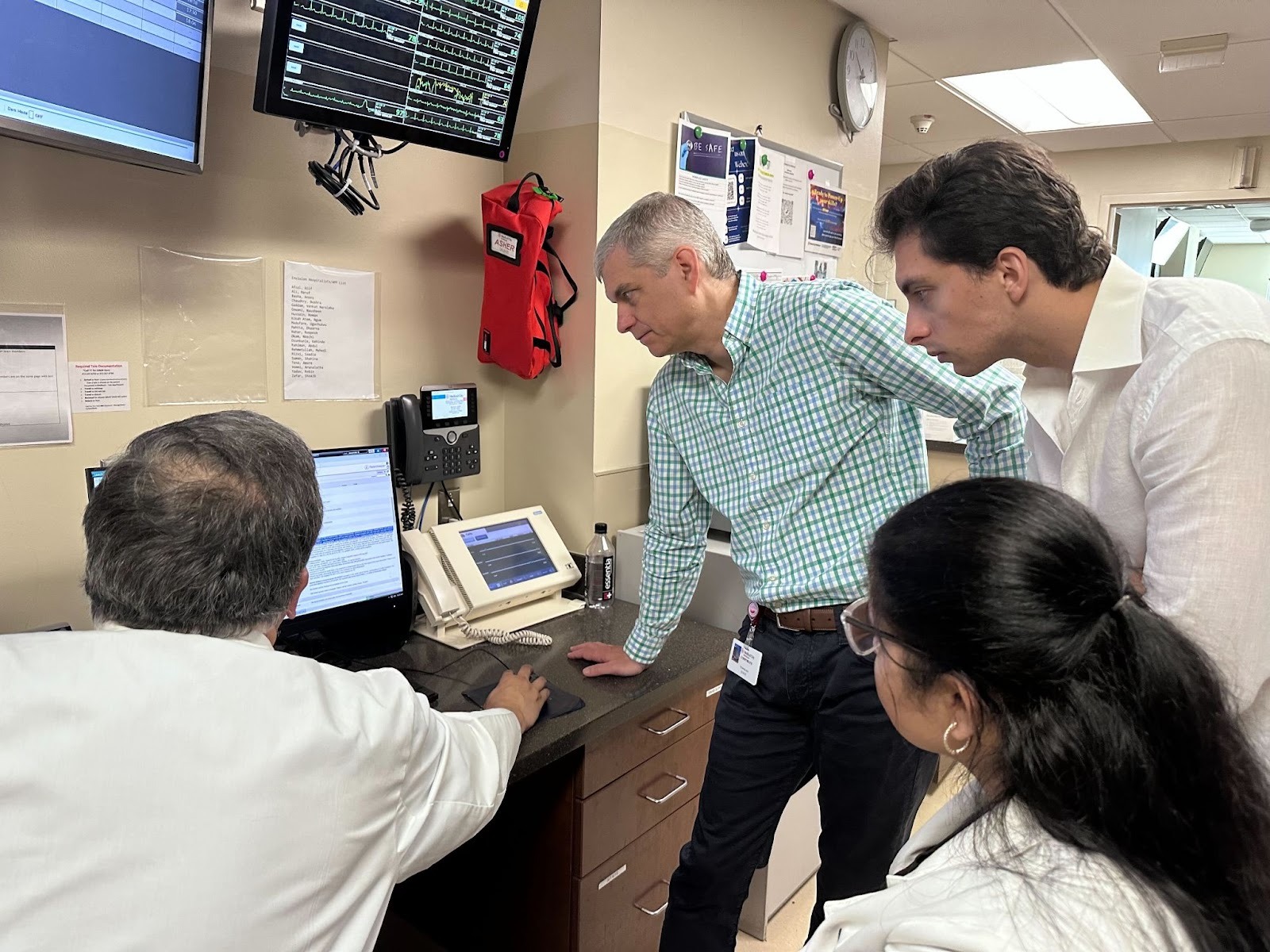At this year’s MUSE Inspire Conference, Dr. Geoffrey Burnham, Hospitalist Medical Director at Medical City Dallas, one of the largest hospitals in HCA Healthcare’s system, joined Commure’s Chief Business Officer, Hersh Solanki, for a fireside chat at Commure’s Product Showcase: “Seamless, Smart, Ambient: Redefining Healthcare Workflows with Commure and MEDITECH.”
As a proud MEDITECH Alliance partner, Commure kicked off with a live demo of Ambient AI, a MEDITECH-vetted solution that seamlessly integrates with Expanse. The conversation then pivoted to Dr. Burnham’s first-hand insights into developing and rolling out Ambient AI, and the impact it’s already having.
What started as a pilot program with one physician has now expanded to the Medical City Dallas team and across the rest of the facilities within the HCA North Texas division, with roughly 200 users in total. According to Dr. Burnham, the change has been fast, meaningful, and driven by a strong partnership between clinicians and Commure’s engineers.
Since deploying Commure Ambient AI, providers in the North Texas division have experienced:

From accurate documentation and improved reimbursement to more time for meaningful patient care, Dr. Burnham shares how this MEDITECH-integrated solution benefits every stakeholder.
“There’s the provider, there’s the patients, and then there’s the hospital itself.”
Focusing More on Patients with Faster Notes
Dr. Burnham explained why he was eager to try ambient documentation in the first place: “One of the things I've always kind of despised about medicine is writing notes.”
Dr. Burnham is not alone in this perspective. In a recent survey, 62% of providers pointed to administrative work as their top source of burnout. Dr. Burnham shared that since its roll out, Commure Ambient AI has made a tangible difference in how he and his team approach documentation at Medical City Dallas. "I know everything I'm doing is getting captured and I just kind of have to put that little bow on it and I'm done.”
That extra face time has had a ripple effect across the patient experience: “I never want patients to feel like I'm rushed. This helps make sure they don’t.”
Driving Better Coding and Billing, For the Provider and the Hospital
Beyond just saving time, Commure Ambient AI directly impacts billing and reimbursement by improving the quality and completeness of documentation. It does this by acting as a built-in safety net for coding:
“[Ambient AI] helps with my coding too. Sometimes I’ll catch something I missed, like a patient mentioning they were constipated, and realize I forgot to order Miralax. It gives me little reminders.”
The end result? More accurate documentation, better reimbursement, and more time for meaningful patient care.
“I don’t have to rush through my day. I can actually sit there, spend the time I need with the patient.”
Co-Creating the Product in Real Time
What made this rollout different, Dr. Burnham emphasized, was how closely he was able to collaborate with Commure’s engineering team.
“I was a “guinea pig” with HCA Healthcare's Digital Transformation and Innovation team. I started working with Commure about a year ago... we took it from the beginning and built it into what it is now.”
He had a direct line to the Commure’s Forward Deployed Engineering (FDE) team, even after hours:
“I’d be texting them at 1:00 in the morning with ideas and feedback and a couple of them would still be awake because they’re okay with it. That’s when I was writing my notes.”
That real-time support helped accelerate development and adoption, according to Dr. Burnham: “It took us two to three weeks and then I could start signing those notes for my patients in the hospital and feel comfortable doing so.”
From that starting point, his team helped shape key features like History & Physical (H&Ps) specific templates, discharge summaries, and embedded feedback tools to the engineering team, which were often improvements that Commure’s FDE team implemented in just a matter of weeks.
Boosting Trust and Adoption Through Transparency
For many providers, handing off documentation to AI raises important concerns about accuracy and accountability. Dr. Burnham acknowledged that building trust was a key part of adoption, and that transparency was critical in making that possible.
“The last thing any clinican wants is any kind of legal issue where it’s like, ‘Okay, you documented this in the note.’ You’re like, ‘No, that wasn’t me, that was the AI.’ But when you have those track changes and you can see what’s going on, you can trust in the product.”
That’s where Commure Ambient AI’s “track changes” view comes in during the clinician’s review. Providers can see a side-by-side comparison with red and green highlights and strike-through formatting. “That transparency is critical for trust,” he said. “If the AI took this out of my last note and added this to my current note, then I know it has everything I need, and I can move on.”
The impact of this close partnership and solution is catching on as the North Texas division adopts Ambient AI at all sites, and providers are eager:
“Most providers were asking us, ‘When can we get this? Is it our turn yet?’ The adoption rate has been great.”
What’s Next: Further Enhancing and Iterating at Speed
Looking ahead, Dr. Burnham sees even more potential. He outlined several needs and future features:
- Discharge summary optimization
- Automated admission order sets
- Medication formulary mapping
- Color-blind accessible diff view
- Summarization of outpatient encounters and inbox messages
Some of these features are already in development, including order queueing and real-time voice queries into MEDITECH.
Dr. Burnham shared, “There’s a lot more we can do, but the pace we’re moving at is faster than I ever expected in a system of this size, with an EHR of this size.”
Advice for Other Health Systems Considering AI
For leaders exploring ambient documentation or clinical AI tools, Dr. Burnham offered straightforward guidance:
“Having the folks who are willing to partner with you... that’s what you need to build a great product.”
He underscored the importance of involving providers early and often, and building a system that allows feedback in real time. All levels of the organization need to be bought-in, from senior levels of leadership down to end-users.
“The easier that is, the easier the change can be made... because we all practice differently, we all train differently. No one of us writes notes the same.”
Reclaiming Time in Medicine with Ambient AI
Commure Ambient AI has helped transform documentation from a burden into a streamlined, provider-friendly process at Medical City Dallas. But perhaps most importantly, it’s given time back to clinicians, so they can give more of it to patients.
As Dr. Burnham summed it up, “I think probably for most of us, 10% of your day is actually practicing medicine and the other 90% is writing notes or doing billing. This helps shift that balance back to where it should be.”

.png)


.avif)
.png)
